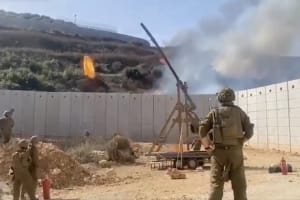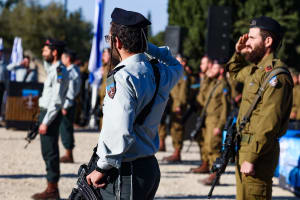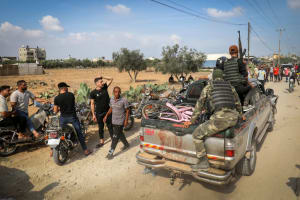Escalation continues: Hezbollah fires 40 rockets, 7 drones at northern Israel claiming it to be 'largest attack since Oct 8'
Two Israelis wounded by rocket shrapnel, 15 fires break out in Golan and Galilee

Hezbollah forces continued their attacks against Israel in the wake of the elimination of its most senior commander to date, launching at least 40 rockets and seven drones at northern Israel within the span of only one hour on Thursday afternoon.
Israel's Magen David Adom rescue services said two people were being treated for injuries from rocket shrapnel in the Golan town of Katzrin.
According to Israel Defense Forces, 40 launches toward the broader Galilee and Golan region were detected, “of which the air defense fighters successfully intercepted several launches.”
A Hezbollah official told Al Jazeera news that the terror group had launched 150 rockets and 30 drones at Israel, claiming to have targeted 15 IDF bases at one time.
“This is the broadest attack since October 8. The goal is to deter Israel and to respond to the killing of the commander Abu Taleb,” the official said.
Firefighters and police have received reports of numerous rocket impacts in northern Israel, following a barrage fired from Lebanon.
— Emanuel (Mannie) Fabian (@manniefabian) June 13, 2024
According to MDA, two men in their 20s are lightly hurt in the Katzrin area in the Golan Heights after being hit by shrapnel.
Rockets that hit… pic.twitter.com/dOxFDTzpLB
In addition, the Israeli army identified seven drones, with four being intercepted and the rest infiltrating Israeli airspace and exploding without causing casualties.
One rocket directly hit a house in Kibbutz Yiron, causing damage but no casualties. Another rocket exploded next to a home in Katzrin.
Several projectiles fell in open areas, once again causing large wildfires in at least 15 locations. Two hours later, fire services announced that 19 firefighting teams were battling two main blazes, one on the Golan Heights and another in the Biriya Forest near Safed.
Hezbollah launched approx. 40 projectiles toward northern Israel moments ago. The IDF Aerial Defense Array successfully intercepted numerous launches, however, a number of hits that fell—ignited fires.
— Israel Defense Forces (@IDF) June 13, 2024
Additionally, five suspicious aerial targets were identified. The IDF Aerial… pic.twitter.com/DZft8YwCgM
Video footage showed several fires burning around the city of Katzrin, the largest Israeli community on the Golan Heights.
The attack triggered the highest number of alarm sirens within a single hour since Hezbollah began targeting Israel on Oct. 8.
Since Thursday morning, 31 drone infiltration alerts were activated across northern Israel, several of which later turned out to be false.
About one hour after the attack, Lebanese sources reported Israel's Air Force (IAF) had begun striking targets in several areas of southern Lebanon.
Earlier in the day, Army Radio reported that the IDF had estimated Hezbollah’s response to the elimination of senior commander Taleb Abdallah to be completed. According to the report, at this stage, the Israeli army doesn’t think the incident will pull Israel and Lebanon into an all-out war.
However, a senior IDF official told Army Radio, “The killing of these commanders will not bring about the desired strategic situation in Lebanon.”
“The graph of the actions of both parties has been on a moderate rise all the time in the last month, and the moment will come when the political level will have to make a decision. We are getting closer to the real moment,” he added.
After Hezbollah fired some 215 rockets at Israel on Wednesday, Prime Minister Benjamin Netanyahu held a security assessment “in light of the developments in the north, and Hamas’s negative response regarding the release of the hostages,” while the U.S. urged "de-escalation."
In a phone conversation on Wednesday, Defense Minister Yoav Gallant and U.S. Defense Secretary Lloyd Austin discussed joint efforts to “de-escalate tensions along the Israel-Lebanon border in the wake of Lebanese Hezbollah’s increased aggression,” according to a Pentagon statement.
“We are concerned about an increase in activity in the north. We don’t want this to escalate to a broad regional conflict and we urge de-escalation,” a Pentagon spokesperson told the press after the call.

The All Israel News Staff is a team of journalists in Israel.
You might also like to read this:














